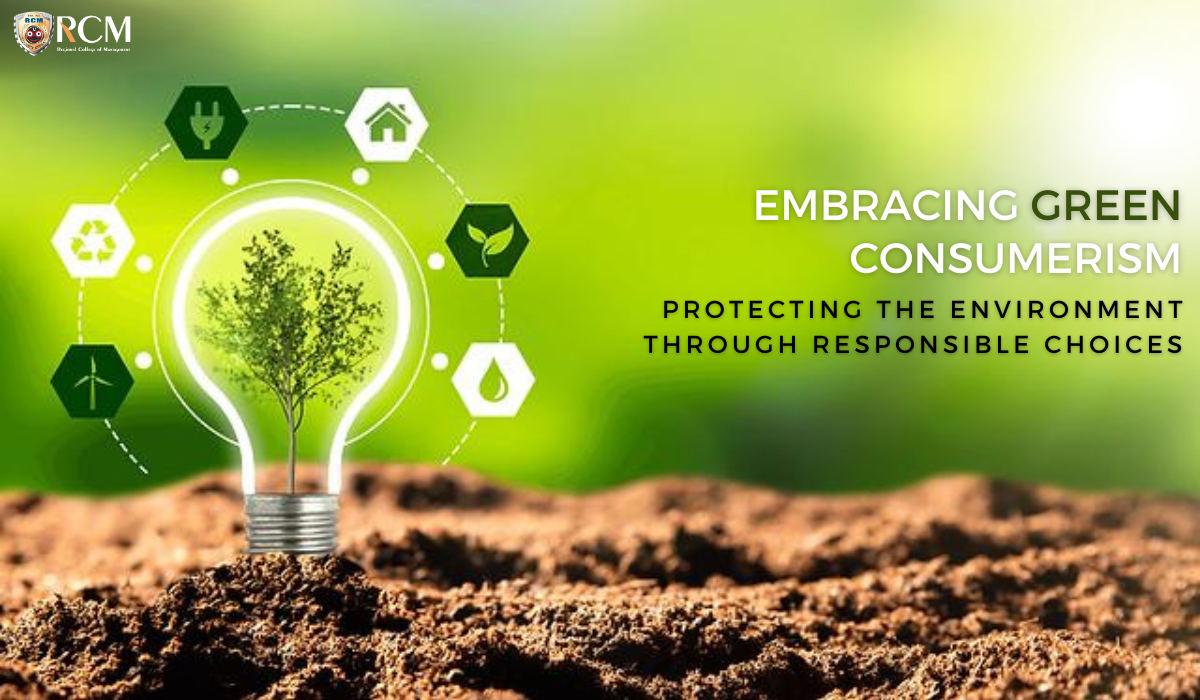Written by Dr. Manas Ranjan Debata || Dean Academics
Green consumerism is a vital part of sustainable living, encouraging individuals to purchase environmentally friendly products that help conserve resources and reduce pollution. By making informed choices, green consumers can minimize the effects of consumerism on the environment, helping to create a cleaner, more sustainable world.
This blog explores the impact of consumerism on the environment, the benefits of eco-conscious behavior, and the role of green consumers in leading the charge toward sustainability.
The Role of Green Consumers
1. Energy Conservation
Green consumers reduce energy usage through energy-efficient appliances and practices such as turning off unused lights or utilizing natural lighting. These actions help reduce the demand for fossil fuels and lower the effects of consumerism on the environment.
2. Adoption of Renewable Energy
By using solar panels and solar-powered devices, green consumers support a transition to renewable energy. This shift reduces the pollution and waste typically caused by traditional energy sources, directly addressing consumerism on the environment.
3. Conscious Product Selection
Choosing products based on energy ratings and environmental impact helps lower consumption rates. Energy-efficient utilities are not only cost-effective but also reduce carbon emissions—diminishing the effects of consumerism on the environment.
4. Recycling and Use of Eco-Friendly Products
Prioritizing recyclable and sustainable products reduces landfill waste. Green consumers actively participate in recycling programs and support industries that minimize packaging, curbing the environmental damage caused by excessive consumer habits.
5. Supporting Local and Organic Food
Locally sourced and organic food cuts down on transportation emissions and supports eco-friendly farming. The food supply chain contributes heavily to consumerism on the environment, and shifting to local goods can mitigate this impact.
6. Practicing Sustainable Consumption
Mindful buying decisions, especially amid growing e-commerce, help reduce unnecessary consumption. Sustainable consumption helps tackle the overproduction and overconsumption trends that drive the negative effects of consumerism on the environment.
Benefits of Green Consumerism
Energy Efficiency & Savings
Using eco-conscious appliances and low-energy devices helps consumers save on utility costs while contributing to long-term sustainability.
Reduced Emissions
Environmentally responsible choices reduce greenhouse gas emissions. These efforts combat climate change and reduce the cumulative damage of consumerism on the environment.
Stimulating Sustainable Economic Growth
Demand for green products drives innovation in sustainable industries. Clean energy adoption grows, generating jobs and reducing reliance on polluting industries—key steps in reducing the effects of consumerism on the environment.
Conclusion:
A Call for Responsible Consumption
Adopting green consumerism is more than just a trend—it’s a critical response to the urgent environmental challenges posed by unchecked consumption. The effects of consumerism on the environment can be mitigated through responsible decisions, reduced energy use, and sustainable buying habits.
By participating in recycling, choosing local and organic food, and supporting renewable energy, green consumers play a key role in shaping a sustainable future. Observing Green Consumers Day on September 28 reminds us of our power to make impactful choices.





























